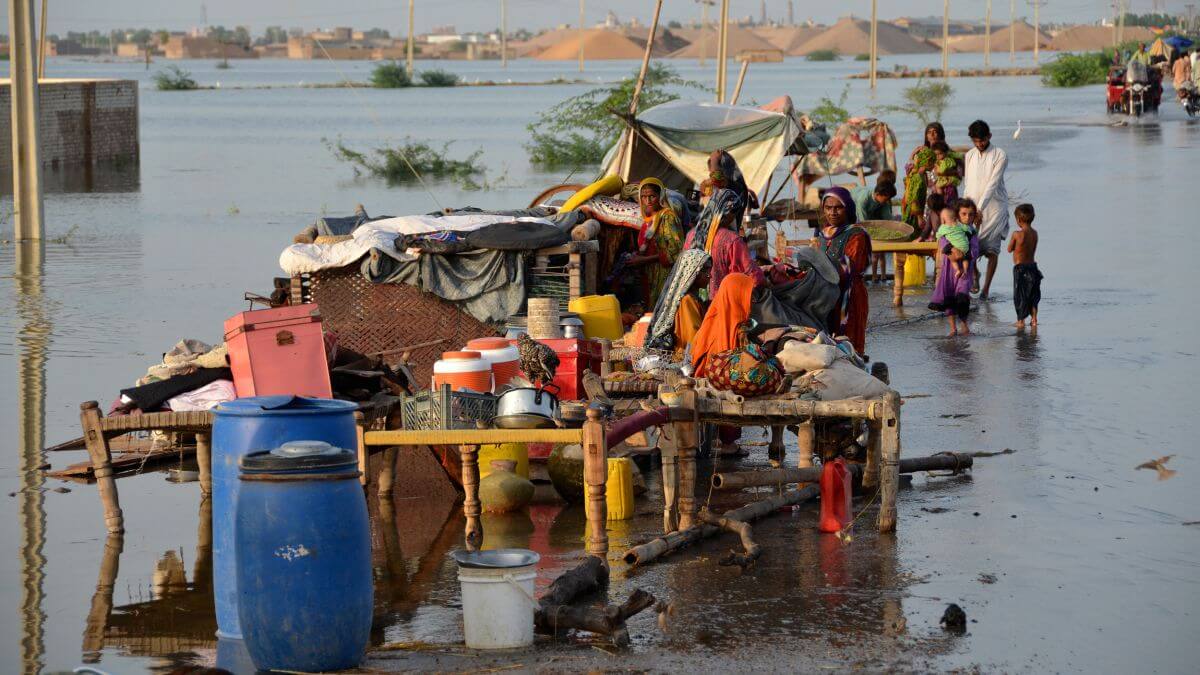In the wake of Indian Prime Minister Narendra Modi expressing ‘sadness’ at the devastation caused by floods in Pakistan, India is reportedly holding negotiations with its neighbour “at the highest levels” regarding the delivery of humanitarian assistance. It would mark the first time India has delivered aid to Pakistan since the Bharatiya Janata Party (BJP) came to power in 2014. Prior to 2014, India extended aid to Pakistan during the 2010 floods and the 2005 earthquake.
On Monday, Modi tweeted that he was “saddened to see the devastation caused by the floods in Pakistan.” He expressed his “heartfelt condolences” and his hope for an “early restoration of normalcy.”
Pakistani Prime Minister (PM) Shehbaz Sharif publicly thanked Modi on Twitter yesterday, reassuring that the “characteristic resilience” of Pakistanis would allow them to “rebuild their lives and communities.”
I thank 🇮🇳 PM Narendra Modi @narendramodi for condolences over the human & material losses caused by floods. With their characteristic resilience the people of 🇵🇰 shall, InshaAllah, overcome the adverse effects of this natural calamity & rebuild their lives and communities.
— Shehbaz Sharif (@CMShehbaz) August 31, 2022
Meanwhile, Pakistani Finance Minister Miftah Ismail said in a tweet on the same day that a number of international agencies are prepared to bring food items from India via the land border. He said the government would proceed with the plan “based on supply shortage position.”
Apart from humanitarian assistance, Ismail has also indicated his willingness to “open trade route with India because of this flood and food price hike,” noting that “If the supply is affected, the import of vegetables (from India) will have to be opened.” “If we have to import vegetables from India, we will do so,” the finance minister declared, adding that other edible items are also being considered.
More than one international agency has approached the govt to allow them to bring food items from India through the land border. The govt will take the decision to allow imports or not based on supply shortage position, after consulting its coalition partners & key stakeholders
— Miftah Ismail (@MiftahIsmail) August 31, 2022
Pakistan suspended all bilateral trade with India back in 2019 in response to New Delhi’s decision to revoke Article 370 of its constitution, which granted special status to Jammu and Kashmir.
However, the prices of basic food items—particularly onions, tomatoes, and chickpeas—have been soaring in the country due to crop destruction from the onslaught of floods that have left a third of the country submerged. In particular, vegetable supply from the breadbasket provinces of Balochistan, Sindh, and south Punjab has been affected, prompting the country to consider accepting aid from India.
The flooding has been attributed to rising sea levels caused by climate change but Pakistan is also in the middle of its monsoon season, which usually extends from July to September. Pakistan has recorded 166.8 millimetres of rain this month, 241% higher than the average. Furthermore, Minister for Climate Change Sherry Rehman has revealed that the country is facing its eighth monsoon cycle this season, compared to an average of two or three in other years.
Truly gut wrenching imagery of the devastating floods in #Pakistan
— Joshua Stevens (@jscarto) August 30, 2022
Left: 🛰️ Landsat 8 on August 4
Right: 🛰️ Landsat 9 on August 28
More info and reporting from @GeoScienceSara: https://t.co/J6S5v5i0gB pic.twitter.com/HQ6oPPbwHK
In the face of unprecedented rains and flash floods, the Pakistani government declared a “national emergency,” calling the heavy rainfall a “climate-induced humanitarian crisis of epic proportions.” Around 1,200 people have been killed so far, and more than 30 million have been rendered homeless.
Ismail has thus called for “broad-based support and assistance,” while Rehman has said the federal and provincial governments cannot handle the situation on their own.
Against this backdrop, in what could be interpreted as an indication of willingness to improve frayed ties, Indian External Affairs Minister (EAM) S. Jaishankar remarked at a recent Asia Society think-tank event that he would be “a very strong votary of more regionalism” and of India being “more generous and more non-reciprocal and more effective in what is building.”
Further discussions on the re-opening of trade routes and the delivery of aid could take place when both Modi and Sharif attend the Shanghai Cooperation Organisation Summit in Uzbekistan in two weeks.

